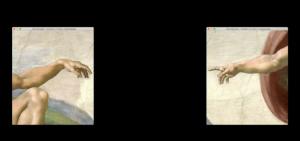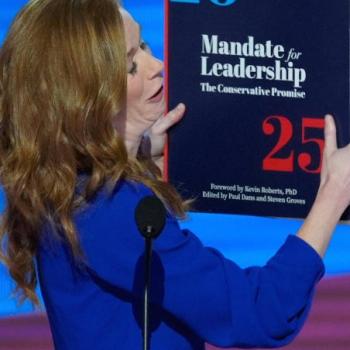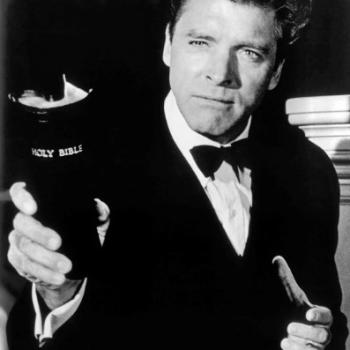 The first question I got when declaring “I am no longer a Christian” is the predictable question “Well, do you still believe in God?” This of course came up in the wake of my last two articles, “I am No Longer a Christian” and “Not a Christian Pt. II”.
The first question I got when declaring “I am no longer a Christian” is the predictable question “Well, do you still believe in God?” This of course came up in the wake of my last two articles, “I am No Longer a Christian” and “Not a Christian Pt. II”.
After I explained in those posts why a set of theological beliefs is not important or necessary for me to pursue spirituality and to leave religion behind, people seem to still be stuck in the binary matrix that if you aren’t a Christian then you must be an atheist. This binary choice is the problem, I think. Believing there are only two options to this question is limiting and wholly unsatisfying. It is classical Western dualism at work.
Ironically, I got this question in one form or another, from two great friends and wonderful people. One is a Christian and the other is an atheist, within the same week after publishing these posts.
My answer to both was the same…what difference does it make?
I am still a human being worthy of dignity as much as you are. My humanity calls me to the same level of love, empathy, and compassion just as you, no matter whether I believe in God or not. What I believe about God or a non-God, does not change my humanity, nor yours.
In other words, I failed to see the relevance of the question. But people are insistent and must have an answer to the question so that they can put a label on you. Good ole human tribalism.
So today, I will do my best to try and answer it. But let me warn you…I have better things to do, so the sooner I address this the sooner I can get on to important things like loving people, helping the “least of these” and seeking justice for every human being on the earth.
So, to begin this esoteric conversation, I will have to start with a question back to my Christian and atheist friends. What do you mean by the word “God?” I cannot answer your question about my belief in “God” until you tell me what you mean by that word.
The funny thing I have discovered is that the atheist and the Christian both have similar ideas about what they mean by the term God…so that makes it convenient and a bit easier to deal with. Without going through the whole history of the changing definition of God by humans over centuries and the Eastern world’s non-dual view of reality and God, what this question boils down to is do you believe in the God of the Bible, which is a theistic being separate from humans?
Now when someone says “the God of the Bible” they may not be aware that the formulation and conception of God even within that sacred text has changed over the millennia. The God of Genesis is quite different from the God of Deuteronomy and the God of the prophets or the God of the New Testament. But putting that theological conundrum aside, I will deal with the general idea of a “theistic God.”
This one is easy…No…I do not believe in a theistic God. There I said it!
A theistic God, as defined by my Christian friend, is a separate entity with a personality and the ability to manifest physically in whatever form he/she wishes. It is described as all-powerful, all-knowing, omnipresent, and a whole lot of “omni” other things that do not make a lot of sense, unless you are a bronze-age or iron-age person with no access to modern scientific information.
This theistic God is said to live in “heaven” wherever that is. It is somewhere in the sky, just beyond the rainbow, I think. People in the Bible are always looking “upward” toward the heavens where God supposedly lives. But the Hubble, Kepler/K2, Tess, and Webb telescopes have not spotted it yet. Not that we might not get a big surprise someday, but well, I’m not holding my breath.
This theistic God is also quite jealous, vengeful, and angry, and demands a human sacrifice to satisfy the requirements of its supposed holiness, even whilst this theistic God has demanded the genocide of whole groups of people. It is eerily similar to some of the worst characteristics of many humans (there is your first clue).
Yes, the contradiction is enough to create a life-long amount of cognitive dissonance or trauma, and many people are still trying to untangle from the toxic guilt and shame this type of deity imposes on individuals.
Additionally, this theistic God requires worship and praise…constantly; it requires prayers and supplications from humans to ask for gifts and rewards which it will give, assuming mere mortals have enough “faith” to believe in it. If you do not have enough faith…well, you are out of luck.
This God seems to have an insatiable narcissistic appetite for attention. If I did not know any better, I would say this theistic God is a completely unpleasant and annoying entity to be around. I know I have taken my leave.
Theism then, envisions an anthropocentric type of super-human entity with supernatural power over all things. It is the child of a historical era long time past. The difference between Zeus and Jehovah is one of degree, not of kind.
Okay, so I have established why I do not believe in theism.
But, in declaring myself not to be a theist, my atheist friend assumed that I was now an atheist…and congratulated me on my arrival. “Not so fast….” quoting one of my favorite college football announcers.
Not being a “theist” does not automatically put you on the atheist team. And here is the little secret. Anyone who says they “know” for sure whether there is a God or not is selling you something. I’m not buying it from either vendor.
The certitude that both camps express is neither helpful nor as certain as they may desire. If the existence of God was something subject to scientific investigation that could be empirically determined, then that would be easy, and I would not be writing this post. But it is not easy.
The complete materialistic philosophy at the base of atheism is wholly unsatisfying at least for me, although it is rational but a bit presumptuous. For that reason, I do not reject or criticize those who have chosen that view. It is inherently more rational than a theistic deity. I only object to the finality and certainty that many atheists promote with the same fundamentalist enthusiasm as my evangelical friends. For that reason, I also reject the absolute atheism of my many atheist friends. What I agree with is the rejection of a theistic “sky God” as I have previously described. But that only means perhaps there are other options beyond the false binary choice we’ve been given. I believe there is.
I get criticized by both sides of the theism-atheism argument, which is fine. But my search for answers to this eternal question, which seems to have no answer, is that I do not need to have a final answer. For me, it is a continuing never-ending search for whatever that finality might be.
For me, the question of God is the journey itself. That is the answer…keep on searching. About the only thing I can say with any certainty is what God is NOT. And theism just does not give me the hope, love, reason, and faith that I need, and atheism is not the completely satisfying answer either.
So, for me, the journey is the destination.
I have come to terms with perhaps never knowing the “answer” once and for all and that is a difficult position for many people to accept. People want finality, certainty, definitions, labels, and answers. But anyone who tells you they have that ultimate final answer has an agenda.
So, what are the other options…there are many. (This won’t be a comprehensive review of options)
When Einstein was asked if he believed in God, he responded by saying:
“I’m not an atheist, and I don’t think I can call myself a pantheist … I believe in Spinoza’s God who reveals himself in the orderly harmony of what exists, not in a God who concerns himself with fates and actions of human beings”.
Einstein certainly was not a theist, nor did he consider himself an atheist. Einstein believed the problem of God was the “most difficult in the world”—a question that could not be answered, “simply with yes or no”. He conceded that “the problem involved is too vast for our limited minds”. If a brilliant mind such as Einstein considers the issue of God to be beyond our limited minds, I will not presume to contradict his conclusion.
So, there is Spinoza’s God which is associated with “all that is.” Everything that is, is God. Sounds circular, but ironically both atheists and pantheists claim Spinoza as their intellectual founder. That is interesting.
Einstein, in an interview, identified the problem of trying to define or understand God. He gave this answer in the form of a parable….a very good teaching tool. He said, when asked about whether he defined himself as a pantheist:
“May I not reply with a parable? The human mind, no matter how highly trained, cannot grasp the universe. We are in the position of a little child, entering a huge library whose walls are covered to the ceiling with books in many different tongues. The child knows that someone must have written those books. It does not know who or how. It does not understand the languages in which they are written. The child notes a definite plan in the arrangement of the books, a mysterious order, which it does not comprehend, but only dimly suspects. That, it seems to me, is the attitude of the human mind, even the greatest and most cultured, toward God. We see a universe marvelously arranged, obeying certain laws, but we understand the laws only dimly. Our limited minds cannot grasp the mysterious force that sways the constellations. I am fascinated by Spinoza’s Pantheism. I admire even more his contributions to modern thought. Spinoza is the greatest of modern philosophers because he is the first philosopher who deals with the soul and the body as one, not as two separate things.”
Humans have discovered much since Einstein’s day. We now know about the human genome, and the Webb telescope is completely rewriting what we know (or think we know) about the universe. But we are still children in the scheme of the totality of reality. To a large degree, we still do not know what we do not know. Perhaps someday we’ll finalize this question and discover the ultimate reality.
Until then, do I believe in God? It depends on what you mean. Some days I think I am an agnostic and on other days, I can see the rationale for being an atheist. Yet, there is pantheism (the belief that God and the universe are the same things rather than separate things), panentheism (which means that all is in God which is beyond the universe), and several other isms that I am still exploring. I’m still searching.
What I have become much more interested in is the connections of human beings to each other, to the universe, and to all that is. From that connection, we find our meaning, our purpose, and our destiny. As Dr. King wrote in a Letter from a Birmingham Jail, “We are caught in an inescapable network of mutuality, tied in a single garment of destiny. Whatever affects one directly, affects all indirectly.”
So, life is my religion…humanity is my connection…and love is God that makes consciousness possible and sustains life. That is the best I can do for you if you want to know if I believe in God. It does not require religion of any kind.
Now, back to more important human concerns…remember…













